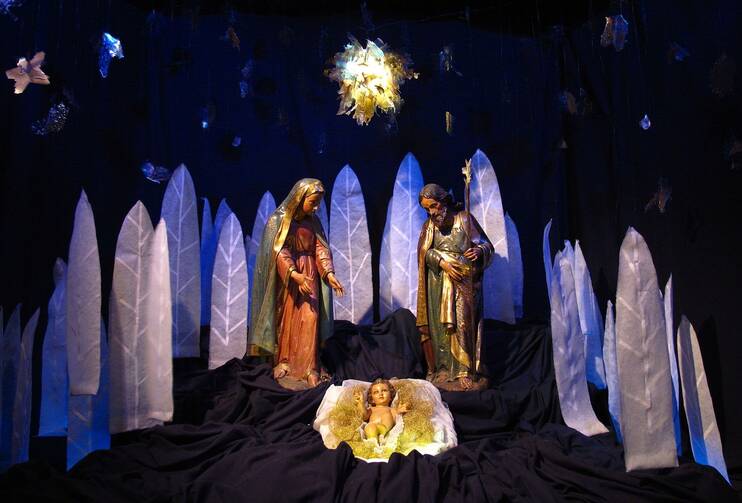This Christmas and every Christmas, God’s Word is love.
Stanley Marrow, S.J., was one of the first professors I encountered when I arrived at Weston Jesuit to study theology in the fall of 2004. He taught New Testament, and the semester I arrived he was offering a course on the Gospel of John. Stanley was beloved by many, not least because of his dramatic personality. His characteristic honesty often subverted any kindness he meant to show his students. Once, as I attempted to make sense of John’s knotty theology, Stanley told me, “Michael, what you just said…that was brilliant! Brilliant, but completely wrong.” We had been discussing the nature of the Logos, and I threw up my hands and said in frustration, “So Stanley, then what is the ‘Word’?”
Those in whom God sees his own son, he admits to be sons and daughters (Amb. De Fide, 5:89)
Think about the image that comes to mind when you hear the word “God.” Does it match the image you have of Jesus Christ?
What example of Christ’s service in the Gospels grabs your imagination? How can you or do you already imitate that example in your life?
What example of Christ’s love holds your imagination? How is your love similar to or different from it?
“Michael, the Word is Christ.”
I am certain at this point I rolled my eyes. “Stanley, that’s a tautology.”
“No Michael, you don’t understand. Christ is all the Father has to say to us… about anything! Christ is God’s only self-description. Christ is God’s only commandment. Christ is God’s only dream for us! Jesus Christ is all God has to say, has ever said and ever will say to us!”
Christ is all we know of God. Stanley’s passion had such an effect on me that his words come to mind every every time I hear this Gospel passage.
Christ is God’s only self-description. John tells us, “No one has ever seen God. The only Son, God, who is at the Father’s side, has revealed him.” The writer of Hebrews understands the same thing, comparing the “partial and various ways” God spoke in the past to the complete message God now offers through Jesus Christ, the “very imprint of his being.” Any idea we have of God we must authenticate by comparing it to Jesus Christ.
God’s only commandment is that we be like Christ. John tells us, “The law was given through Moses, grace and truth came through Jesus Christ” (1:17). What Christians call the “Law of Moses” our Jewish brothers and sisters call the Torah,a word better translated “instruction.” The Torah is a set of instructions for becoming a human being. For Christians, the set of instructions comprises the example and commandments of Jesus Christ. In John’s Gospel, Jesus symbolizes the grace he offers when he washes his disciples’ feet and commands us to do the same (13:1-17). He expresses the entire truth he learned from the Father in one commandment, “Love one another as I have loved you” (13:34-35).
Christ is God’s only dream for humanity. “The Word became flesh, and made his dwelling among us” (1:14). God took on human form in the manger in Bethlehem in order to teach us how to become like Christ. This is God’s greatest gift to us, the ability to be like Christ, to share his life and his spirit, and to be a disciple who can share his grace with the world. Both the first reading and the psalm dream of the day when all the ends of the earth will experience God’s salvation. In light of the Gospel today, that dream will find fulfillment when all people on earth follow paths of service and love in all they do.
All we know of God is the incarnate Christ, and his legacy is service and love. These are at the heart of Christian spirituality, and the basis of every Christian’s vocation. Our salvation is that God sees and loves in us what God sees and loves in Jesus Christ. We celebrate that hope today as we celebrate the Word made flesh.








